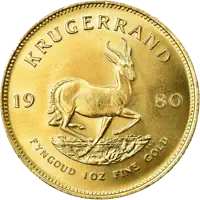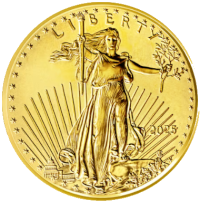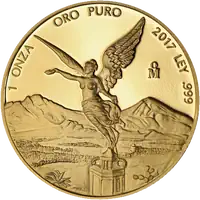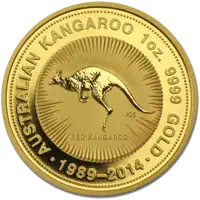Gold Bullion
Your Gold Investment Journey
Classic $5 Gold Coins
Classic U.S. gold coins with investment potential. Discover the historical significance and modern value of these American gold pieces that combine numismatic appeal with precious metal content for your gold bullion portfolio.
One Ounce Gold Coins
Popular choices for modern investors. Explore trusted one-ounce gold coins, including American Eagles, Canadian Maple Leafs, and other internationally recognized gold bullion coins.
Coins vs Bullion
Understand the differences between collectible coins and pure bullion. Learn which option suits your goals, budget, and risk tolerance in this comprehensive gold bullion comparison.
Secondary Market Performance
See how rare gold coins perform on the secondary market. Analyze pricing data and market trends for informed buying and selling of gold bullion investments.

Canadian Gold Maple Leaf
Introduced: 1979
Purity: .9999 fine gold
One of the world’s first and most recognized bullion coins, featuring the iconic maple leaf on the reverse and Queen Elizabeth II (now King Charles III) on the obverse. Celebrated for its exceptional purity and global trust among investors. 📈 See today’s pricing and purchase online
United Kingdom – Britannia Gold Coin
Introduced: 1987
Purity: .9999 fine gold (since 2013)
Features Britannia, a symbol of British strength and resilience. The obverse typically displays Queen Elizabeth II (or now King Charles III). Known for its advanced security features and exceptional craftsmanship.
📈 See today’s pricing and purchase online
China – Gold Panda
Introduced: 1982
Purity: .999 fine gold
Features a charming panda design that changes annually. The obverse displays the Temple of Heaven in Beijing. Highly collectible due to its unique, artistic, and evolving designs.
📈 See today’s pricing and purchase online
South Africa – Gold Krugerrand
Introduced: 1967
Purity: .9167 fine gold (22 karat)
Features a springbok antelope on the reverse and Paul Kruger on the obverse. One of the most recognized and widely traded gold bullion coins in the world.
📈 See today’s pricing and purchase online
American Gold Eagle
Introduced: 1986
Purity: .9167 fine gold (22 karat)
Features Augustus Saint-Gaudens’ iconic depiction of Lady Liberty on the obverse, with a family of eagles on the reverse (updated in 2021 to a single eagle portrait). Backed by the U.S. government for weight and purity, it’s a cornerstone of American bullion investing.
📈 See today’s pricing and purchase online
Mexico – Gold Libertad
Introduced: 1981
Purity: .999 fine gold
Features the Winged Victory statue with Mexico’s iconic volcanoes in the background. The obverse displays the Mexican national coat of arms. Renowned for its beauty, artistry, and limited mintage.
📈 See today’s pricing and purchase online
Australia – Gold Kangaroo
Introduced: 1986
Purity: .9999 fine gold
Features a detailed image of the iconic red kangaroo. The obverse shows Queen Elizabeth II (or now King Charles III). Celebrated for its exceptional purity and annually changing designs.
📈 See today’s pricing and purchase online
Austria – Gold Philharmonic
Introduced: 1989
Purity: .9999 fine gold (24 karat)
Features the Great Organ of the Golden Hall in Vienna’s Musikverein on the obverse and a collection of orchestral instruments on the reverse. Europe’s first 24‑karat gold bullion coin and one of the best‑selling gold coins worldwide.
📈 See today’s pricing and purchase online
Understanding Gold as an Investment
Historical Performance and Stability of Gold
Gold bullion has a long history as a store of value, maintaining worth through scarcity and acceptance. During economic uncertainties like the 2008 crisis or recent volatility, gold bullion has demonstrated its ability to preserve wealth.
Key Insight: Gold bullion often moves inversely to stock markets and currencies, making it vital for diversification.
Types of Gold Products Today
Investors have options such as gold coins, bars, and rounds, each with advantages depending on strategy and budget. Coins offer recognition and backing, bars provide more gold per dollar, and rounds are cost-effective alternatives.
Purity Standards and Certification
Most investment-grade gold bullion is .999 fine or higher. Certificates of authenticity, micro-engraving, and serial numbers help verify authenticity and prevent counterfeiting.
Building Your Gold Portfolio Strategy
Investment Allocation
Experts suggest allocating 5-10% of your portfolio to precious metals, with gold bullion as a core component. During economic uncertainty, increasing allocation can be a defensive move.
Storage & Security
Physical gold bullion requires secure storage: safes, bank vaults, or depositories. Many investors combine methods for accessibility and security.
Tax & Reporting
Gold bullion is taxed as a collectible, with capital gains rates up to 28%. Proper reporting and planning are essential to maximize returns and ensure compliance.
Market Dynamics & Timing
Factors Influencing Prices
Inflation, currency strength, interest rates, geopolitical stability, supply constraints, and central bank policies all impact gold bullion prices. Understanding these helps in timing your investments.
Dollar-Cost Averaging vs Lump Sum
Regular purchases (dollar-cost averaging) can mitigate volatility, while lump-sum investments may be advantageous during market distress when gold performs well as a safe haven.
Investment Tip: Consider short-term conditions and long-term trends, but remember gold bullion mainly preserves wealth rather than growing it.
Frequently Asked Questions





 '
' 




